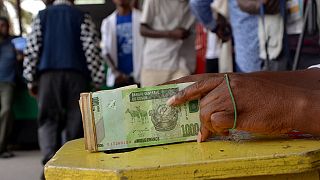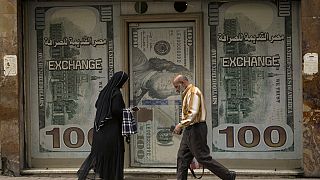Egypt
Annual inflation in Egypt hit a new high in January as the country continues to struggle with price increases and currency depreciation, Egypt's statistics bureau said on Thursday.
The Central Agency for Mobilization and Statistics released figures showing that annual inflation rose to 26.5% last month from 21.9% in December. In January 2022, that same figure stood at just 8%, before soaring after the outbreak of the Russian war in Ukraine the following month, which shook the global economy.
In January, commodity prices in Egypt continued to rise. The cost of bread and cereals rose an average of 6.6%, while the price of meat and poultry soared 20.6%, the office said.
Egypt's economy has been hit hard by years of government austerity, the coronavirus pandemic and the fallout from the war in Ukraine. Egypt is the world's largest wheat importer, with most of its imports traditionally coming from Eastern Europe.
Low-income Egyptian households, most of whom rely on government subsidies for staples such as bread, are hardest hit by these sustained increases. Nearly 30% of Egyptians live in poverty, according to official figures.
In December, Egyptian authorities and the International Monetary Fund (IMF) agreed on a $3 billion bailout to ease the crisis. The IMF deal was made in exchange for Egypt implementing a number of economic reforms, including adopting a flexible exchange rate. The agreement also includes the possibility of additional funding of $14 billion for Egypt.
The value of the Egyptian pound continued to decline after Egypt's decision to adopt a flexible exchange rate. The currency has lost around 50% of its value against the dollar since the start of 2022.
On Wednesday, the Egyptian government unveiled plans to sell stakes in dozens of state-controlled companies, including banks and energy firms. Economists have long criticized the economic dominance of the Egyptian government and military, calling it an obstacle to the growth of the private sector.
Egypt also faces a shortage of foreign currency. Many banks have imposed limits on foreign money withdrawals, while the Egyptian government has announced that it is postponing many future projects that would require large foreign expenditures.














01:09
Nigeria's inflation rate surges as food prices escalate
11:07
Botswana's new government races to diversify its economy {Business Africa}
01:29
Political analyst says Donald Trump's win moves US to the right
11:07
Benin: Tapping the potential of luxury tourism [Business Africa]
01:02
Kenya's supreme court reinstates 2023 finance law after appeals court nullification
01:05
Financial audit forces Senegal to reassess IMF program strategy